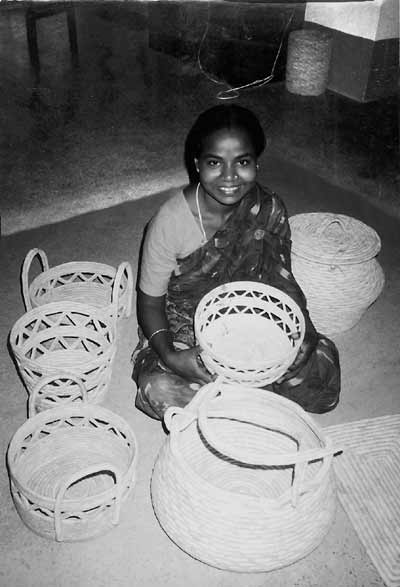
BIRMINGHAM, Ala. (BP)–Kathie Lee Gifford came under fire because it was said some of her clothing line was produced under questionable circumstances.
Human rights issues abound in most any discussion of China. Yet, the government of the United States chooses to grant the country “normal trade relations” status.
The problems and concerns of contracting with Third World entities to produce goods often come into the spotlight. But it seems little is done to make sure the workers are paid fairly and not enslaved.
There are denominations and organizations in the United States, however, that are marketing these products in a special way and, more importantly, are diligently trying to make sure the craftspeople receive a livable income from their work.
One such group is the Woman’s Missionary Union auxiliary of the Southern Baptist Convention. Through its WorldCrafts product line, the national WMU sells home decor and accessories, gift and baby items, jewelry, baskets, candles and Christmas decorations, among other things.
Karen Flowers, WorldCrafts project manager, said the endeavor began in 1995, the idea of WMU’s then-executive director, Dellanna O’Brien. It is a way to offer Third World artisans an opportunity to receive fair prices for their handicrafts.
WMU already sold various other products, so the computer system and warehouse needed for WorldCrafts were in place, Flowers explained.
Then, by working through missionaries on the field who come in contact with these artisans, the product line developed. New artisans and countries have been added with each subsequent catalog, Flowers said.
The latest catalog, released Sept. 1, features 17 countries and territories, the new ones being Kenya, Turkey, Guyana, the West Bank, Zimbabwe and South Africa, she added.
Most of the craftspeople featured in the catalog aren’t Christians, Flowers went on to explain. But the WorldCrafts effort does give missionaries working with the artisans the opportunity to minister to them. In some cases, it gives the missionaries a “business” reason for being in a country where they wouldn’t be welcome otherwise.
When the artisans go to a certain location to pick up supplies for making the items or to drop off the finished products, they may get to be involved in Bible studies. “Some,” noted Flowers, “have become Christians through this ministry.”
In several countries, the artisans are offered medical clinics, literacy courses and self-improvement classes, such as nutrition and hygiene, she said.
WorldCrafts “doesn’t solicit any crafts,” Flowers noted. Instead, missionaries on the field encounter the artisans and contact WorldCrafts. Most of the missionaries are Southern Baptist, but a few are evangelical missionaries recommended to WorldCrafts by Southern Baptist missions personnel.
WorldCrafts works with missionaries in the various countries to find out what a fair price is for a certain product in that particular land. “[The artisans] are paid for all their labor and items up front, whenever we receive them,” Flowers said. Unsold items are never returned.
For WMU, the financial goal of WorldCrafts is to run as a cost-recovery operation so as not to be subsidized by WMU. Anything above cost recovery would go back into the project, she explained. Since 1995, the sales volume has grown from $7,000 to $100,000 annually.
WMU’s primary way of marketing WorldCrafts is through home parties.
So as not to overwhelm the craftspeople with orders, WorldCrafts began the home party concept on a small scale. The parties mainly have been held in Alabama and Kentucky, Flowers said. During each of the last three years, there have been about 100 parties in Alabama. But this year it becomes a nationwide endeavor, she said, adding that she anticipates having to limit the number of parties due to the high demand.
The buyers, during the parties at which the items are sold, learn about other countries, taste new foods and feel good about helping artisans who either wouldn’t have a market or would receive little for their work otherwise.
Flowers also said the parties and the unique products get the buyers excited about missions. A party in Kentucky actually helped to revitalize a WMU group.
Girls in Action (GAs) get in on the enthusiasm too. The GAs at First Baptist Church, Troy, Ala., have a party and fashion show once a year as part of its WorldVentures, the individual achievement plan for GA.
Betsy Gates, who works with GAs at the church, said the response always is positive. “The ladies enjoy ordering things from different countries.”
Melissa Bowen of Prattville, Ala., has hosted two parties and plans to have a third one in the fall. She likes to host the events for her Women on Mission group at First Baptist Church, Prattville.
She also gives WorldCrafts items as Christmas gifts and includes a note explaining a little about the countries from which they came. She sees this fair trade concept as “a way to participate in ministering and assist the people who make WorldCrafts.”
For more information on holding a WorldCrafts party or to request a catalog, call WMU Customer Service at 1-800-968-7301 or email Flowers at [email protected]. The products also may be viewed and purchased by visiting www.wmustore.com
–30–
Pritchett is a correspondent for The Alabama Baptist. (BP) photo posted in the BP Photo Library at www.sbcbaptistpress.org. Photo title: WORLD CRAFTS.
















